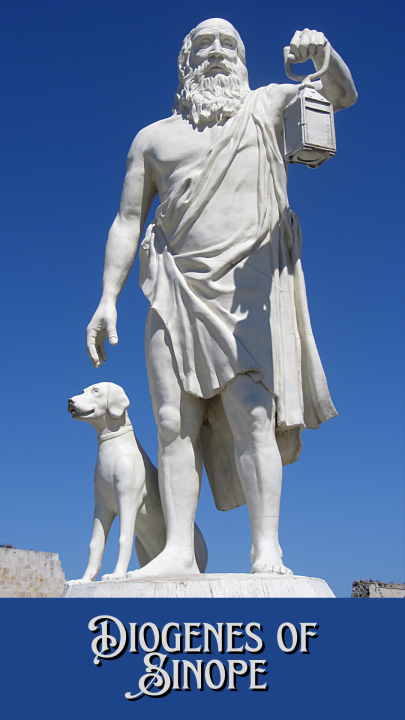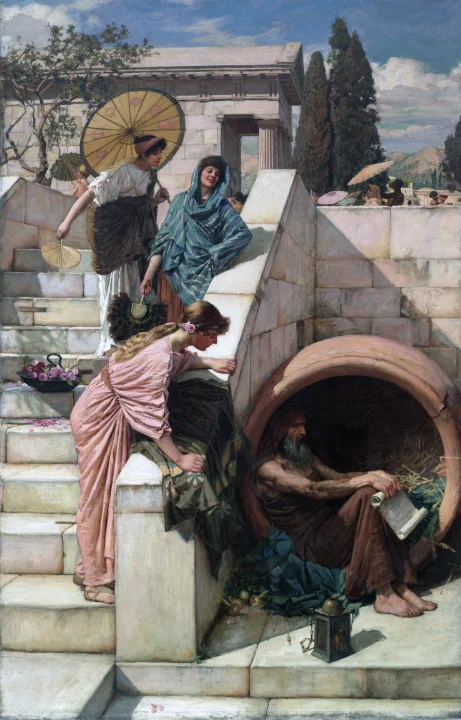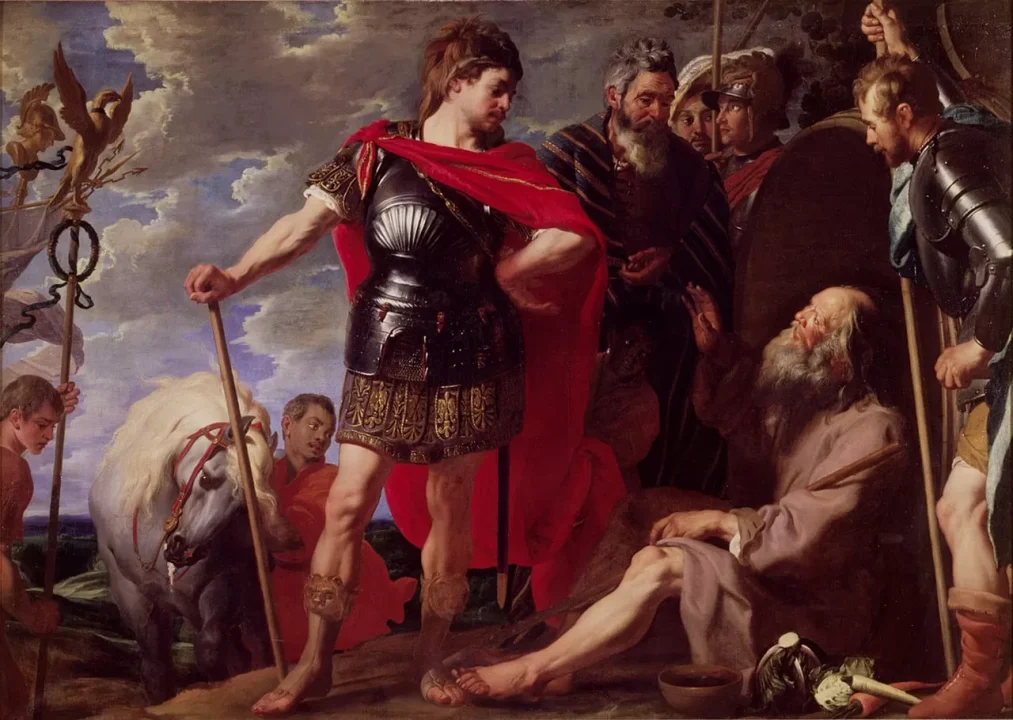📅 8 Feb 2025 • 📖 9 min read
Diogenes of Sinope (c. 404-323 BCE) was the most famous and idiosyncratic philosopher who walked this earth. He found outrageous ways to popularize the Cynic principles.Diogenes was born in Sinop, in ancient Asia Minor (modern-day Turkey), around 412 BC. He was captured by pirates and sold into slavery. He eventually settled in Corinth, where he lived and taught his philosophy of Cynicism.
Alas, none of his writings survive even though he is said to have authored over ten books, a volume of letters, and seven tragedies.
Plato once called him a “Socrates gone mad.” Many called him by his nickname, “Diogenes the Dog,” due to his highly unconventional and provocative ways of teaching Cynicism.
Despite these nicknames, there was a method to his madness. His sharp tongue critiqued the hypocrisies of society and spoke truth to the power. He even brushed aside Alexander the Great.
Diogenes remains a fascinating figure because of his wild life stories.
Diogenes, Lantern, And A Dog
There is a statue of Diogenes in Sinope on the Black Sea coast of Turkey. It stands at the narrowest point of the Sinop Peninsula isthmus, and is a famous tourist attraction.
Made of bronze, painted white, it has Diogenes standing on a barrel, holding a lantern in his left hand, with a dog at his feet. All the elements in the statue are symbolic of key aspects of his life and philosophy.

The Lantern: Diogenes walked around Athens with a lantern in the daytime. He would hold it close to the faces of the citizens, telling them he was searching for an honest man.
This act was his sharp critique of the moral corruption and hypocrisy in society. The ‘lamp of reason’ in Diogenes’ hand on his statue still berates us, as if he is still searching for an honest man in today’s times.
The Dog: The dog at his feet is a nod to his nickname, “Diogenes the Dog,” and his association with the Cynic philosophy. The term “Cynic” itself comes from the Greek word “kynikos,” meaning “dog-like.”
Diogenes fully embraced this label. It let him famously register his rejection of social norms. The dog-life symbolized his commitment to living a simple life outside the conventional bounds of society.
Many times, he actually acted like a dog.
How Diogenes Lived (Like A Dog)
Diogenes was nicknamed “the Dog” equally for his Cynic philosophy and his deliberate acts imitating the natural, unrestrained life of a dog. He unabashedly embraced this role fully, provoking people.
Diogenes did not own anything, except a tattered gown and a cup. Whenever he needed something, he begged for it. He slept in a wine cask in the marketplace. And ate onions to offend people with his foul breath.
Some infamous examples of his “dog-like” antics:
Barking at People
Diogenes didn’t just act like a dog—he also “barked” like one.
If someone approached him whom he did not wish to speak to, or if he wanted to mock someone’s behavior, he would bark at them.
It was a known practice of Cynic philosophers. This wasn’t just for shock value; it was a deeper critique of human pretensions.
Barking marked rejection of social pretensions and needless interactions. It was a shockingly effective way to remind people how much artificial human behavior has become of late.
Living in a Barrel/Tub
Perhaps his most famous “dog-like” behavior was his choice to live in a large cask (wine barrel), rejecting the need for a house or possessions.
Like a stray dog, Diogenes embraced homelessness and simplicity, showing that true happiness did not depend on material wealth.
When people mocked his living conditions, he responded with biting humor, often pointing out how much freer he was than they were, burdened as they were by their belongings and social obligations.

Eating in Public
Ancient Greece considered eating in public as highly improper. But Diogenes being Diogenes, he defied this norm as well.
He would sit in the marketplace, eating whatever scraps he had, just like a stray dog would. When people criticized him for it, he quipped, “If eating is natural, why should it be done in private?”
Though not a dog-like behavior, legend has it that Diogenes would often go on a diet almost exclusively of onions. It was his way to offend unwarranted people with his breath. So that those who truly wanted to hear him should first be able to tolerate his onion-breath.
Public Urination and Defecation
Diogenes believed humans should live in accordance with nature, free of societal conventions. To prove this, he would often relieve himself in public, with no qualms.
On one occasion, he urinated on a man who insulted him. It was outright rude, but It was Diogenes’ way of showing that he cared nothing for the insults of that man.
Similarly, he was known to defecate in public spaces, as a dog would, to illustrate his rejection of social taboos. We don’t object to dogs passing stool in public? Then why should the same act by a human be held as unnatural and to be ashamed of?
Relieving Semen in Public
One of Diogenes’ most shocking—and talked-about—acts was his habit of masturbating openly in public. When people expressed outrage and disgust at his behavior, he responded with his usual sharp wit.
He reportedly said, “If only it were as easy to relieve hunger by rubbing my stomach.”
This was his way of mocking society’s prudishness and absurd priorities. He felt humans had unnecessarily complicated their lives, and should rather go back to their natural instincts without shame.
Why Did Diogenes Act Like A “Dog”?
Diogenes wasn’t just being crude for the sake of it. His dog-act was to show three main principles of Cynic philosophy:
- Simplicity: Dogs live with minimal needs, and so did Diogenes.
- Indifference to Shame: Dogs feel no embarrassment about natural acts, and neither did Diogenes.
- Directness in Protest: Dogs bark at things or people they see as threats or disturbances. Similarly, Diogenes openly criticized and challenged societal norms, hypocrisy, and figures of authority.
When someone mocked him for acting like a dog, Diogenes reportedly said,
“I fawn on those who give me something, I bark at those who refuse, and I bite scoundrels.”
When Diogenes Defied Alexander the Great
One of the most famous encounters in ancient philosophy is the meeting between Diogenes of Sinope and Alexander the Great.
It’s a story of two vastly different lives crossing paths. Diogenes, the ragged, defiant Cynic philosopher, and Alexander the Great, the most powerful man in the known world.

Alexander, hearing of Diogenes’ reputation as a philosopher who scorned wealth, power, and social norms, decided to visit him in Corinth.
At the time, Diogenes was living as simply as ever—dwelling in a clay jar (or tub) in the marketplace, owning almost nothing, and devoting his days to teaching and making biting critiques of society.
When Alexander arrived, surrounded by his regal entourage, he found Diogenes basking in the sun, completely unbothered by the commotion. The young conqueror, amused and perhaps a little curious about Diogenes’ audacity, approached him and said,
“I am Alexander the Great. I have heard of your wisdom. Ask me for anything you desire, and I shall grant it.”
Without even looking up, Diogenes replied casually,
“Yes, there is something you can do for me. Step aside—you’re blocking my sunlight.”
Stunned by the philosopher’s boldness, Alexander stood silently for a moment. Then, instead of taking offense, he laughed and turned to his followers, declaring,
“If I were not Alexander, I would wish to be Diogenes.”
This legendary interaction evokes everything Diogenes stood for: his complete indifference to power, wealth, and status, and his commitment to living a life unshackled by material desires or societal expectations.
Heartwarmingly, it also highlights Alexander’s admiration for the philosopher’s uncompromising freedom, even though they came from opposite extremes of society.
The story remains a timeless reminder that true life satisfaction doesn’t come from conquering others, but from mastering oneself.
And that sometimes, the humblest figure can leave even the mightiest ruler humbled.
When Diogenes Did Not Want Burial
Diogenes had this strange request for what was to be done to his body after his death.
As he grew older, his followers and friends occasionally asked him what he wanted done with his body after he died. They hoped for some practical instructions.
But, in typical Diogenes fashion, his response was anything but ordinary. He told them,
“When I die, throw my body over the city walls. Let the beasts and birds feast on me.”
Shocked, his followers protested.
“How can you suggest such a thing? It’s disrespectful! What if the wild animals tear you apart?”
Diogenes, ever the sharp-witted philosopher, replied with a smirk,
“If it bothers me, just give me a stick to fend them off.”
His friends, confused, said,
“But you’ll be dead! You won’t be able to feel anything or use a stick.”
Diogenes retorted, laughing,
“Exactly! If I wouldn’t feel anything, why should I care what happens to my body?”
In that, Diogenes taught that the body was just a vessel, and once life was gone, it held no use. So why we fear death—a natural and inevitable part of life—or what comes after?
Diogenes wanted to make a final statement about the futility of social customs, like elaborate burials, at a natural process of life that is death.
Was Diogenes A Stoic
Diogenes was a Cynic and not a Stoic.
He was a student of Antisthenes, the founder of the Cynic school of thought, and held his teacher’s asceticism. The Cynics, unlike the Stoics, rejected societal conventions and material possessions.
But Diogenes did play a vital role in the birth of Stoicism, an enduring school of Greek philosophy. Diogenes taught Crates of Thebes, who then mentored Zeno of Citium, the founder of Stoicism.
Final Words
Diogenes was always challenging social norms and forcing people to confront their own hypocrisies.
These stories, shocking as they are, are part of the reason Diogenes remains a fascinating figure. Through his “dog-like” behavior, he exposed the absurdities of social norms and reminded people of the simplicity and honesty of living in accordance with nature.
Remember, Diogenes is still searching for an honest man!
√ Also Read: Life & Philosophy of Marcus Aurelius: Philosopher King
√ Please share it with someone if you found this helpful.